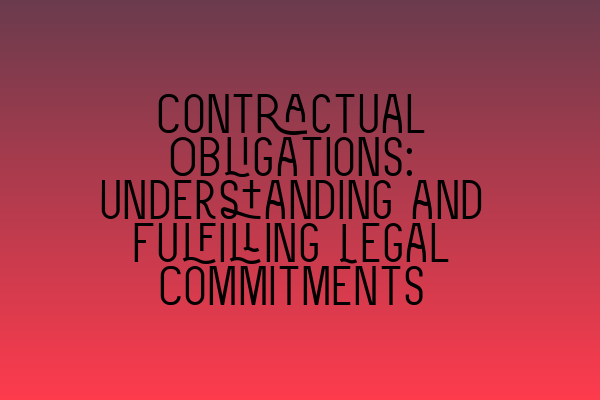Contractual Obligations: Understanding and Fulfilling Legal Commitments
Contracts play a vital role in the world of business and commerce. They are legally binding agreements that outline the rights and obligations of the parties involved. Whether you are a business owner, an individual entering into a contract, or a legal professional, it is essential to understand and fulfill your contractual obligations. In this article, we will explore the key concepts of contractual obligations and provide valuable insights into ensuring compliance with legal commitments.
The Importance of Contractual Obligations
Contracts are the foundation on which business transactions are built. They establish the terms and conditions that parties must adhere to, ensuring clarity, certainty, and fairness in business dealings. Fulfilling contractual obligations is paramount for maintaining professional relationships, earning trust, and avoiding legal disputes. The failure to fulfill these obligations can result in financial losses, damaged reputation, and even legal action.
Understanding Contractual Obligations
When entering into a contract, it is crucial to thoroughly understand the obligations you are undertaking. Contractual obligations refer to the specific duties and responsibilities that parties agree to perform or provide as part of the agreement. These obligations can include, but are not limited to:
- Delivery of goods or services
- Payment of consideration
- Maintaining confidentiality
- Meeting deadlines
- Providing warranties or guarantees
- Complying with applicable laws and regulations
Each contractual obligation should be clearly articulated in the contract itself. It is crucial to draft contracts with precision and attention to detail to avoid ambiguity and potential conflicts down the line. Legal professionals specializing in contract law can provide valuable guidance in this regard.
Fulfilling Contractual Obligations
Fulfilling contractual obligations requires careful planning, proactive management, and timely execution. Here are some key steps to ensure compliance:
- Thoroughly Review the Contract: Familiarize yourself with all the terms, conditions, and obligations outlined in the contract. Identify your specific obligations and take note of any deadlines or performance criteria.
- Plan and Allocate Resources: Determine the resources, manpower, and equipment required to fulfill your obligations effectively. Adequately allocate these resources to ensure timely delivery and avoid any potential delays or breaches.
- Communication and Collaboration: Maintain open lines of communication with the other party/parties involved in the contract. Promptly address any concerns, seek clarifications, and provide regular updates on your progress.
- Document Everything: Keep detailed records of all communication, agreements, and activities related to the contract. This documentation will serve as valuable evidence in case of any disputes or disagreements.
- Comply with Legal and Regulatory Requirements: Stay informed about the applicable laws, regulations, and industry standards that may impact your contractual obligations. Ensure full compliance to avoid any legal complications.
- Seek Legal Advice if Needed: If you encounter any challenges or uncertainties regarding your contractual obligations, do not hesitate to seek legal advice. A contract law specialist can provide valuable insights and help you navigate complex legal issues.
Conclusion
Understanding and fulfilling contractual obligations is essential for maintaining trust, protecting your interests, and building strong business relationships. By comprehensively reviewing and planning for your obligations, communicating effectively, and complying with all legal requirements, you can ensure a smooth and successful contract execution. Remember, contracts are not to be taken lightly, and fulfilling your obligations is a fundamental professional and legal responsibility.
For more information about the SQE exam and preparation, you may find these articles interesting:
